外研版英语八年级下册 Module 8 Time off 模块复习课件 (共52张PPT)
文档属性
| 名称 | 外研版英语八年级下册 Module 8 Time off 模块复习课件 (共52张PPT) | 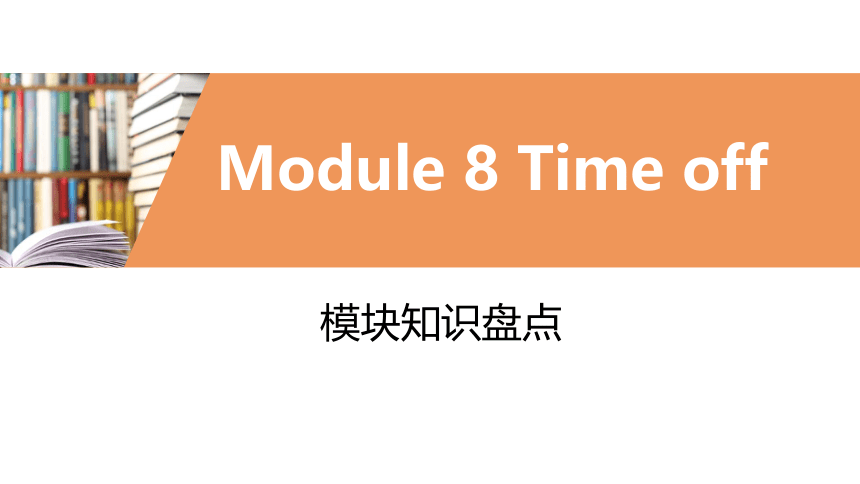 | |
| 格式 | pptx | ||
| 文件大小 | 934.2KB | ||
| 资源类型 | 教案 | ||
| 版本资源 | 外研版 | ||
| 科目 | 英语 | ||
| 更新时间 | 2022-08-28 18:24:45 | ||
图片预览

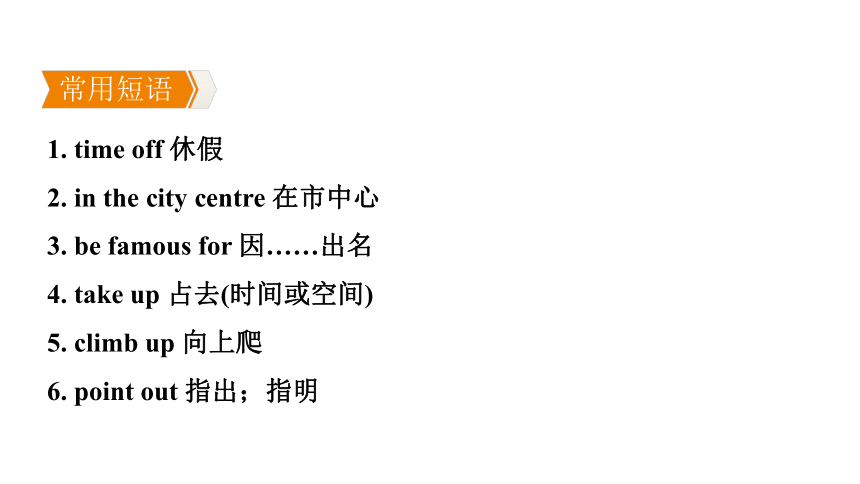
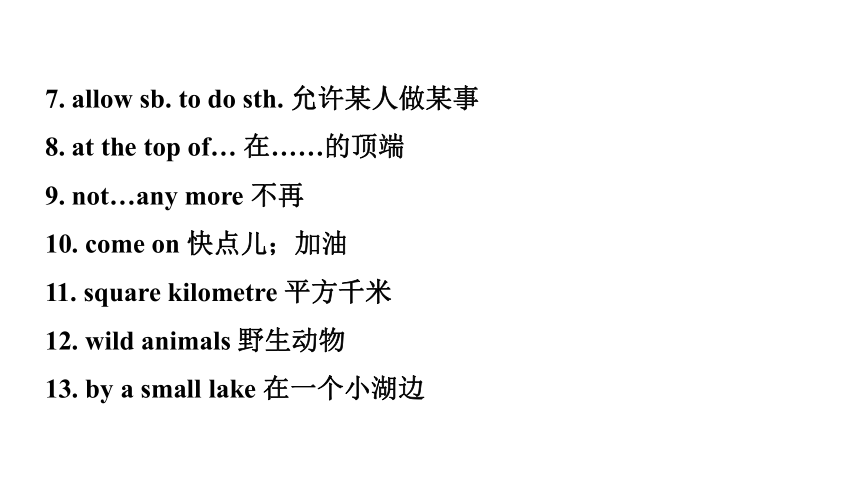
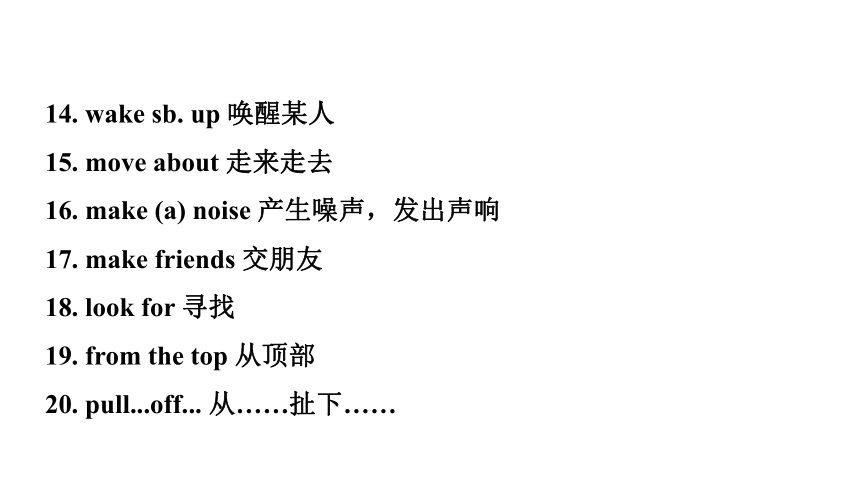

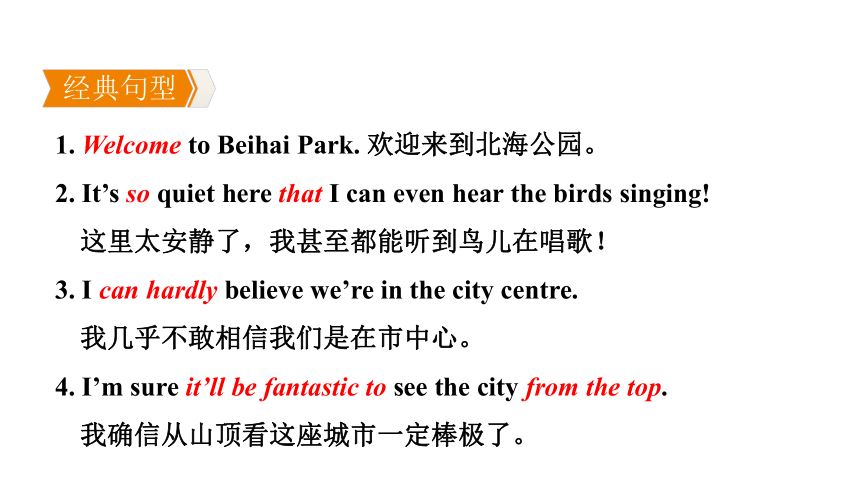
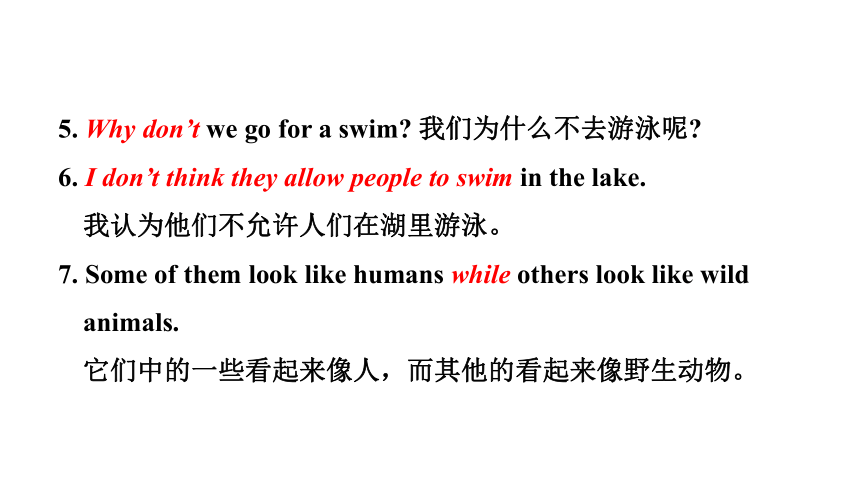
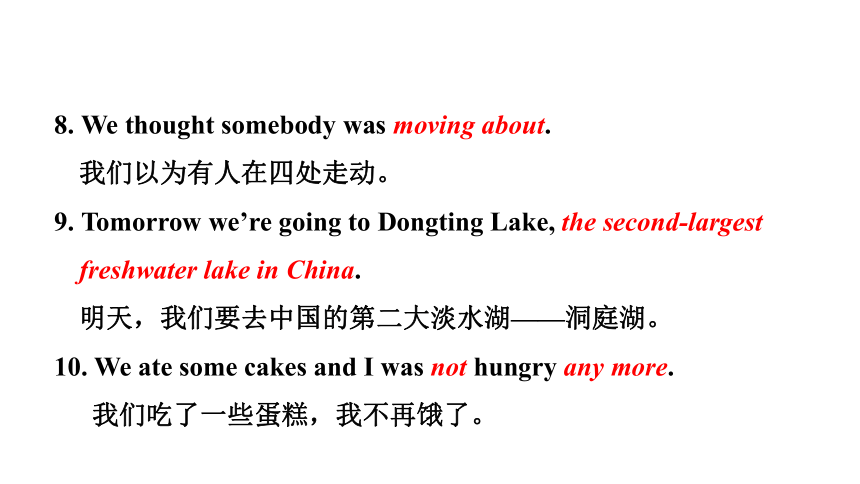

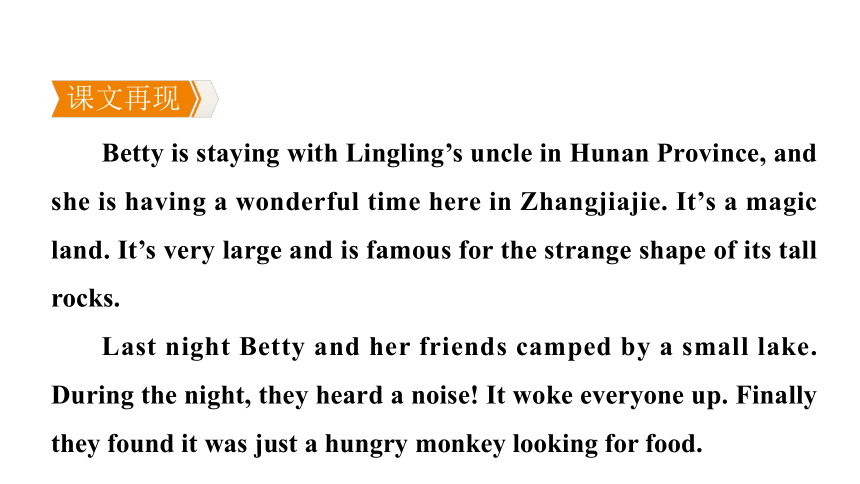
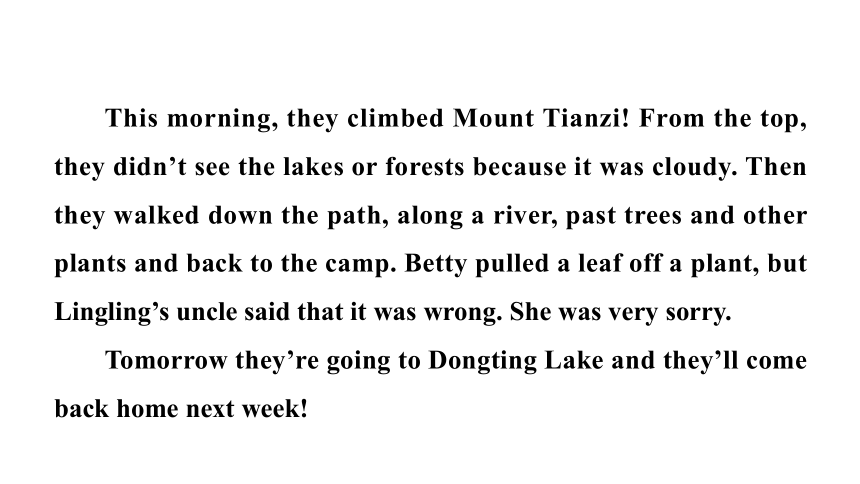
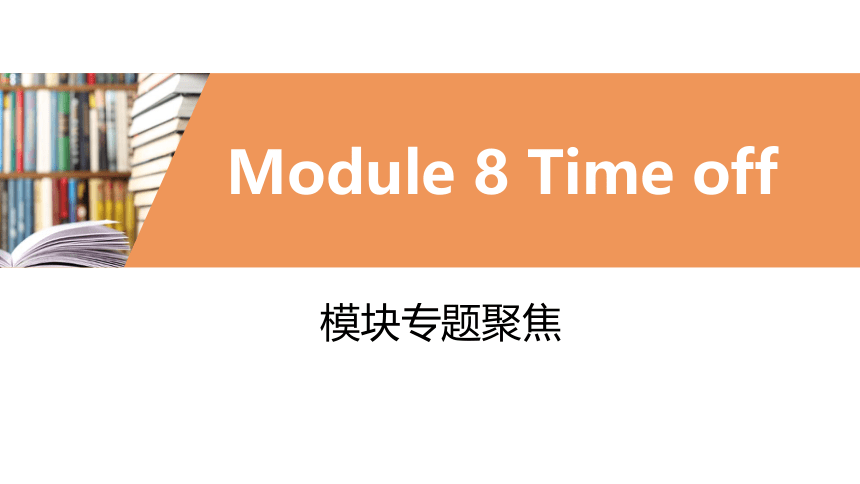
文档简介
(共52张PPT)
Module 8 Time off
模块知识盘点
常用短语
1. time off 休假
2. in the city centre 在市中心
3. be famous for 因……出名
4. take up 占去(时间或空间)
5. climb up 向上爬
6. point out 指出;指明
7. allow sb. to do sth. 允许某人做某事
8. at the top of… 在……的顶端
9. not…any more 不再
e on 快点儿;加油
11. square kilometre 平方千米
12. wild animals 野生动物
13. by a small lake 在一个小湖边
14. wake sb. up 唤醒某人
15. move about 走来走去
16. make (a) noise 产生噪声,发出声响
17. make friends 交朋友
18. look for 寻找
19. from the top 从顶部
20. pull...off... 从……扯下……
21. agree on 就……取得一致意见
22. dance to the music 随着音乐跳舞
23. be popular with 受……欢迎
24. the sights of… ……的风景
25. in the lake 在湖里
26. promise to do sth. 保证做某事
经典句型
1. Welcome to Beihai Park. 欢迎来到北海公园。
2. It’s so quiet here that I can even hear the birds singing!
这里太安静了,我甚至都能听到鸟儿在唱歌!
3. I can hardly believe we’re in the city centre.
我几乎不敢相信我们是在市中心。
4. I’m sure it’ll be fantastic to see the city from the top.
我确信从山顶看这座城市一定棒极了。
5. Why don’t we go for a swim 我们为什么不去游泳呢
6. I don’t think they allow people to swim in the lake.
我认为他们不允许人们在湖里游泳。
7. Some of them look like humans while others look like wild
animals.
它们中的一些看起来像人,而其他的看起来像野生动物。
8. We thought somebody was moving about.
我们以为有人在四处走动。
9. Tomorrow we’re going to Dongting Lake, the second-largest
freshwater lake in China.
明天,我们要去中国的第二大淡水湖——洞庭湖。
10. We ate some cakes and I was not hungry any more.
我们吃了一些蛋糕,我不再饿了。
语法点睛
that引导的宾语从句是由陈述句来充当的。
课文再现
Betty is staying with Lingling’s uncle in Hunan Province, and she is having a wonderful time here in Zhangjiajie. It’s a magic land. It’s very large and is famous for the strange shape of its tall rocks.
Last night Betty and her friends camped by a small lake. During the night, they heard a noise! It woke everyone up. Finally they found it was just a hungry monkey looking for food.
This morning, they climbed Mount Tianzi! From the top, they didn’t see the lakes or forests because it was cloudy. Then they walked down the path, along a river, past trees and other plants and back to the camp. Betty pulled a leaf off a plant, but Lingling’s uncle said that it was wrong. She was very sorry.
Tomorrow they’re going to Dongting Lake and they’ll come back home next week!
Module 8 Time off
模块专题聚焦
巧品语法
语法精讲
that引导的宾语从句
命题情报
中考试题中由陈述句充当宾语从句的复合句一般不 会直接考查,但在阅读理解中,如果不能正确分析句子 成分,将会阻碍正确理解句子,从而影响阅读理解的准 确答题。平时学习中要注意这类宾语从句的一些特点。
1 宾语的几种形式
1. He likes football. (名词作宾语)
2. I beat him. (代词作宾语)
3. I enjoy playing computer games. (v.-ing作 宾语)
4. He wants to change his lifestyle. (不定式作 宾语)
5. I understand that you have suffered a lot. (从句作 宾语)
2 宾语从句概述
宾语从句就是在复合句中作宾语的名词性从 句,通常放在主句谓语动词(及物动词)或介词之 后。宾语从句的引导词根据其表达意义的肯定与疑 问的差别可以分为三类:一类由that引导,一类由 whether/if引导,还有一类由特殊疑问词引导。本 模块我们学习由that引导的宾语从句。
I think that this answer is correct. 我认为这个答案是正确的。
I want to know whether/if you will come soon.
我想知道你是否很快就来。
Do you know when the meeting will begin
你知道会议将于什么时候开始吗
3 由that引导的宾语从句
当谓语动词表示肯定的概念时,如“认为”、 “希望”、“相信”、“知道”、“说”等,由陈述句 变成的宾语从句用that引导,语序不变。that在句中 无实际意义,因此多数情况下that可以省略。
Betty thinks (that) books can help us gain knowledge.
贝蒂认为书可以帮助我们获得知识。
I hope (that) it will be sunny this afternoon.
我希望今天下午天气晴朗。
I believe (that) you’re right. 我相信你是正确的。
[注意] 并非所有的动词后面都可接that引导 的从句。接that引导的从句的谓语动词不具有疑问 的含义,而常见的多是表示观点、看法、意念、 要求等概念的词, 如:believe,feel,hear, hope, expect,explain,prefer,promise,report,say, see,tell,think,understand,wish等。
4 宾语从句的否定前移
如果主句的谓语动词是think, guess, believe, suppose等词, 且主句主语为第一人称, 后面的宾语从 句要表示否定概念, 一般将否定词not转移到主句的 谓语前, 这种现象叫“否定前移”。
I don’t think it is right of him to treat you like that.
我认为他像那样对你是不正确的。
将下列句子改为含有宾语从句的复合句
1. The boy is clever. I think.
___________________________________________________
2. I will be a pilot. I hope.
___________________________________________________
3. He is doing his homework. He explains.
___________________________________________________
考点直击
I think (that) the boy is clever.
I hope (that) I will be a pilot.
He explains (that) he is doing his homework.
4. “I haven’t finished my homework,”Tom says.
___________________________________________________
5. He tells us. The teacher will come back from the UK soon.
___________________________________________________
6. Do you know She will go to the cinema with us.
___________________________________________________
7. He wants to speak to the headmaster. He says.
___________________________________________________
Tom says (that) he hasn't finished his homework.
He tells us (that) the teacher will come back from the UK soon.
Do you know (that) she will go to the cinema with us
He says (that) he wants to speak to the headmaster.
8. That is an interesting film. We know.
___________________________________________________
9. “I will bring my daughter to the party,” Mrs Smith says.
___________________________________________________
10. He says, “I can learn English well.”
___________________________________________________
We know that is an interesting film.
Mrs Smith says (that) she will bring her daughter to the party.
He says (that) he can learn English well.
介绍旅游胜地以及描述旅游经历
写作技巧指导
1. 本模块的话题是“旅游”。该话题常常要求学生介绍某一处风景名 胜或一次旅游经历等。
2. 写该话题作文时应该注意以下几点: ①这类题材宜写成说明文或记叙文。 ②要注意说明顺序。 ③在文章最后描述自己的心情。
妙解写作
写 作 案 例
假如你叫张华,今天是6月6日(星期六),你和同学们一起去森林公园郊游,在那里度过了快乐的时 光。请根据图中的提示以及内容要点,用英语写一篇日记。
内容要点: 1. 天气、目的地以及出行方式;
2. 活动包括野餐、放风筝、爬山……
3. 表达自己的感受。
参考词汇:nature 大自然
地点 活动 感受
Forest Park picnic fly kites climb the mountain
happy
要求:1. 80词左右,日记开头已给出,不计入总词数。
2. 必须包括所有内容要点,不要逐句翻译,可以适当发挥。
3. 文章条理清楚,语句通顺,语法正确。
4. 文中不得出现考生真实的姓名和所在学校的名称。 Saturday, June 6th Sunny
I had a good tour today.
___________________________________________________
素 材 积 累
词汇库
leaf 叶子 tent 帐篷
waterfall 瀑布 rock 岩石
beautiful 美丽的 cloud 云
sheep 羊 horse 马
shape 形状 journey 旅行
camp 营地 visit 参观
tourist 游客 sight 风景
during 在……期间 dangerous 危险的
relaxing 令人放松的 diving 潜水
beach 沙滩 surfing 冲浪
短语箱
have a picnic 野餐 the top of ……的顶部
summer vacation 暑假 by train 乘火车
such as 比如 places of interest 风景名胜
last Saturday 上周六 square kilometres 平方公里
the centre of ……的中心 take photos 拍照
make noise 发出噪声 be famous for 因……而闻名
at the foot of the mountain 在山脚下
fall asleep 入睡
here and there 到处
all kinds of 各种各样的
句式链
① Travelling can not only help us to gain knowledge about geography and history, but also help us keep healthy.
旅游不仅能帮我们学到有关地理和历史的知识,而且能帮助我们保持健康。
② Travelling has now become much more popular than ever before in China.
现在在中国旅游比过去受欢迎多了。
③ The summer holiday is around the corner. 暑假要来了。
④ It’s a place worth visiting. 它是一个值得参观的地方。
⑤ Travelling will relax your mind and soul.
旅行将会使你的思想和心灵放松。
⑥ Last summer, I went camping with my classmates.
去年夏天,我和我的同学们去野营了。
⑦ It was our first time to be away from our families.
这是我们第一次离开家。
五 步 妙 解
审
体裁 应用文 话题 介绍旅游经历
时态 一般过去时 人称 第一人称为主
段落 布局 开头:总述“我”今天进行了一次愉快的旅行。 主体:具体描述旅游的天气以及所见所做。 结尾:对旅行的评价和感想。 谴
The birds sing happily.
将以上句子的时态改为过去进行时:
_____________________________________________________
The birds were singing happily.
引出话题
具体描写
总结归纳 (画龙点睛)
I had a good tour today.
We all enjoyed nature and felt very happy.
模
This morning the weather was….My
classmates and I…The mountain was…
We could see…
The air was…and the birds were…
We fl ew kites…At noon we…Then we…
Saturday, June 6th Sunny
I had a good tour today. This morning the weather was fine, and I got to school very early. My classmates and I took a special bus to Forest Park at 8:30. When we got there, we were very excited. The mountain was so beautiful. We could see flowers and grass here and there.
润
The air was so fresh, and the birds were singing happily. We fl ew kites and climbed the mountain there. At noon we had a picnic together. Everyone took out delicious food and drinks to share. Then we danced and sang for a long time. Certainly we also took many pictures together.
We all enjoyed nature and felt very happy.
点
1.该篇短文符合题目所提的日记的要求。整篇文章结构清晰:第一句引出话题;其后内容 紧扣题目要求,从天气、目的地、出行方式、活动内容(野餐、放风筝、爬山)等方面具体 描述了旅行的经过;最后抒发了自己的感想。
2.较好地使用了连词,如:when。
3.正确使用了一般过去时描述旅游经历。
4.副词的运用使文章生动起来,如:happily修饰singing,体现了鸟儿的欢快;so修饰beautiful,突出了大山的美丽。
5.最后一段抒发了自己的感想,使文章得到了升华。
小 试 身 手
请以“My Pleasant Trip”为题,根据要求,描写你记忆中一次愉快的旅行。
要求: 1. 请叙述这次旅行的时间、地点、人物以及具体的活动等;
2. 词数:80词左右。
_____________________________________________________
_____________________________________________________
One possible version:
My Pleasant Trip
There are many places of interest in Beijing. And my favourite one is the Great Wall. It is about six or seven metres high and four or five metres wide. It has a long history of more than 2,000 years. It was built by the ancient Chinese people.It's so famous that many people coming from every part of the world visit it. The Great Wall is the pride of our nation.
I visited it with my friends last week. When we stood on it, we saw mountains
around it. It looked like a huge dragon. We took a lot of photos and had a good time there.
I'm looking forward to visiting it again.
补全空缺题
如果希望明确、深刻地理解一篇文章,必须对文章的结构有所了解,把握住全篇的文脉,即句与句、段 与段之间的逻辑关系。
阅读理解中的补全空缺题就是依据上面的这个理念。补全空缺题通常有以下几种方法:
1. 如果空缺设在段首
培优课堂
(1)通常是段落的主题句。
认真阅读后文内容,根据段落一致性原则,查找相关的词,推断出主题句。
(2)与后文是并列、转折、因果关系等。
着重阅读后文第一二句,锁定线索信号词,然后在选项中查找相关特征词,通常正确答案的最后一句与 空白后的第一句在意思上是紧密衔接的,因此这两句之间会有某种衔接。
(3)段落间的过渡句。
这时要瞻前顾后找启示,即阅读上一段结尾部分,通常正确答案与上一段结尾有机地衔接起来,并结合 下一段内容,看所选的答案是否将两段内容连贯起来。
2. 如果空缺设在段中
着重看前后两句,查找关键词,寻找句子之间的联系,以确定本句。
3. 如果空缺设在段尾
(1)空白前的一句或两句是重点语句,重点阅读以锁定关键词。
(2)通常是结论或概括性语句。
注意在选项中查找表示结果、总结等的信号词,如as a result, in short, in a word等词语,选项中也可发现 前文的同义词句。
(3)与前文是转折或对比关系。
此时要注意在选项中查找表示转折对比的关联词,同时注意选项中所讲内容是否与前文在同一主题上形 成对立、对比关系。
(4)与前文是并列或排比关系。
在这种情况下,通常是该段落要求补全说明本段主题的其他细节,因此,根据段落一致性原则,在原文 和选项中找到相关的特征词,通常选项中会出现表示并列或递进关系的关联词或与前文类似的句式结构,或 出现同义词等其他线索。
(5)所选答案是引出下一段的内容。
如果在选项中找不出与前文之间的关联,此时可考虑与下一段开头是否有一定的衔接。认真阅读下一段 开头几句,看是否与选项可以紧密连接起来。
【典例】
What do we do when we go camping
First, we work out a plan. We take food, clothing, a knife, and things for cooking and eating. We take things to keep us away from insects(虫子) and the sun.
Then we put everything into the car and we drive to the woods(树林), and we look for a good place for our tent. The place should have a lot of moving air.
This will keep some insects away. High land with water on both sides of it is good. Then we put up our tent. We put everything into the tent, and we are ready for fun. We can swim in the lake, walk in the woods, climb a mountain, take a boat, or go fishing.
In the evening we come back to the tent. We build a big fire(火) because it can keep the insects away. We sit around the fire and talk. We may tell interesting stories or we may sing songs.
_____We can look up at the stars. It is a busy day, so we try to go to sleep early. Everything is dark. Everything is quiet. We hope we won’t hear music from the radio in the next tent. We hope it won’t rain.
【题目】 Which of the following can be put in the “_____” in
Paragraph 5
A. In the morning, we get out of the tent.
B. At noon, we have some delicious food.
C. At night we lie down on the grass.
D. In the afternoon, we wash some fruits.
【答案】C
【解析】本题是补全空缺题。纵观全文可知,本文按照时间线来描述野营。前一段句首讲到“In the evening…”,由此可知本段应该是之后的时间段。故选C。
谢 谢 观 看!
Module 8 Time off
模块知识盘点
常用短语
1. time off 休假
2. in the city centre 在市中心
3. be famous for 因……出名
4. take up 占去(时间或空间)
5. climb up 向上爬
6. point out 指出;指明
7. allow sb. to do sth. 允许某人做某事
8. at the top of… 在……的顶端
9. not…any more 不再
e on 快点儿;加油
11. square kilometre 平方千米
12. wild animals 野生动物
13. by a small lake 在一个小湖边
14. wake sb. up 唤醒某人
15. move about 走来走去
16. make (a) noise 产生噪声,发出声响
17. make friends 交朋友
18. look for 寻找
19. from the top 从顶部
20. pull...off... 从……扯下……
21. agree on 就……取得一致意见
22. dance to the music 随着音乐跳舞
23. be popular with 受……欢迎
24. the sights of… ……的风景
25. in the lake 在湖里
26. promise to do sth. 保证做某事
经典句型
1. Welcome to Beihai Park. 欢迎来到北海公园。
2. It’s so quiet here that I can even hear the birds singing!
这里太安静了,我甚至都能听到鸟儿在唱歌!
3. I can hardly believe we’re in the city centre.
我几乎不敢相信我们是在市中心。
4. I’m sure it’ll be fantastic to see the city from the top.
我确信从山顶看这座城市一定棒极了。
5. Why don’t we go for a swim 我们为什么不去游泳呢
6. I don’t think they allow people to swim in the lake.
我认为他们不允许人们在湖里游泳。
7. Some of them look like humans while others look like wild
animals.
它们中的一些看起来像人,而其他的看起来像野生动物。
8. We thought somebody was moving about.
我们以为有人在四处走动。
9. Tomorrow we’re going to Dongting Lake, the second-largest
freshwater lake in China.
明天,我们要去中国的第二大淡水湖——洞庭湖。
10. We ate some cakes and I was not hungry any more.
我们吃了一些蛋糕,我不再饿了。
语法点睛
that引导的宾语从句是由陈述句来充当的。
课文再现
Betty is staying with Lingling’s uncle in Hunan Province, and she is having a wonderful time here in Zhangjiajie. It’s a magic land. It’s very large and is famous for the strange shape of its tall rocks.
Last night Betty and her friends camped by a small lake. During the night, they heard a noise! It woke everyone up. Finally they found it was just a hungry monkey looking for food.
This morning, they climbed Mount Tianzi! From the top, they didn’t see the lakes or forests because it was cloudy. Then they walked down the path, along a river, past trees and other plants and back to the camp. Betty pulled a leaf off a plant, but Lingling’s uncle said that it was wrong. She was very sorry.
Tomorrow they’re going to Dongting Lake and they’ll come back home next week!
Module 8 Time off
模块专题聚焦
巧品语法
语法精讲
that引导的宾语从句
命题情报
中考试题中由陈述句充当宾语从句的复合句一般不 会直接考查,但在阅读理解中,如果不能正确分析句子 成分,将会阻碍正确理解句子,从而影响阅读理解的准 确答题。平时学习中要注意这类宾语从句的一些特点。
1 宾语的几种形式
1. He likes football. (名词作宾语)
2. I beat him. (代词作宾语)
3. I enjoy playing computer games. (v.-ing作 宾语)
4. He wants to change his lifestyle. (不定式作 宾语)
5. I understand that you have suffered a lot. (从句作 宾语)
2 宾语从句概述
宾语从句就是在复合句中作宾语的名词性从 句,通常放在主句谓语动词(及物动词)或介词之 后。宾语从句的引导词根据其表达意义的肯定与疑 问的差别可以分为三类:一类由that引导,一类由 whether/if引导,还有一类由特殊疑问词引导。本 模块我们学习由that引导的宾语从句。
I think that this answer is correct. 我认为这个答案是正确的。
I want to know whether/if you will come soon.
我想知道你是否很快就来。
Do you know when the meeting will begin
你知道会议将于什么时候开始吗
3 由that引导的宾语从句
当谓语动词表示肯定的概念时,如“认为”、 “希望”、“相信”、“知道”、“说”等,由陈述句 变成的宾语从句用that引导,语序不变。that在句中 无实际意义,因此多数情况下that可以省略。
Betty thinks (that) books can help us gain knowledge.
贝蒂认为书可以帮助我们获得知识。
I hope (that) it will be sunny this afternoon.
我希望今天下午天气晴朗。
I believe (that) you’re right. 我相信你是正确的。
[注意] 并非所有的动词后面都可接that引导 的从句。接that引导的从句的谓语动词不具有疑问 的含义,而常见的多是表示观点、看法、意念、 要求等概念的词, 如:believe,feel,hear, hope, expect,explain,prefer,promise,report,say, see,tell,think,understand,wish等。
4 宾语从句的否定前移
如果主句的谓语动词是think, guess, believe, suppose等词, 且主句主语为第一人称, 后面的宾语从 句要表示否定概念, 一般将否定词not转移到主句的 谓语前, 这种现象叫“否定前移”。
I don’t think it is right of him to treat you like that.
我认为他像那样对你是不正确的。
将下列句子改为含有宾语从句的复合句
1. The boy is clever. I think.
___________________________________________________
2. I will be a pilot. I hope.
___________________________________________________
3. He is doing his homework. He explains.
___________________________________________________
考点直击
I think (that) the boy is clever.
I hope (that) I will be a pilot.
He explains (that) he is doing his homework.
4. “I haven’t finished my homework,”Tom says.
___________________________________________________
5. He tells us. The teacher will come back from the UK soon.
___________________________________________________
6. Do you know She will go to the cinema with us.
___________________________________________________
7. He wants to speak to the headmaster. He says.
___________________________________________________
Tom says (that) he hasn't finished his homework.
He tells us (that) the teacher will come back from the UK soon.
Do you know (that) she will go to the cinema with us
He says (that) he wants to speak to the headmaster.
8. That is an interesting film. We know.
___________________________________________________
9. “I will bring my daughter to the party,” Mrs Smith says.
___________________________________________________
10. He says, “I can learn English well.”
___________________________________________________
We know that is an interesting film.
Mrs Smith says (that) she will bring her daughter to the party.
He says (that) he can learn English well.
介绍旅游胜地以及描述旅游经历
写作技巧指导
1. 本模块的话题是“旅游”。该话题常常要求学生介绍某一处风景名 胜或一次旅游经历等。
2. 写该话题作文时应该注意以下几点: ①这类题材宜写成说明文或记叙文。 ②要注意说明顺序。 ③在文章最后描述自己的心情。
妙解写作
写 作 案 例
假如你叫张华,今天是6月6日(星期六),你和同学们一起去森林公园郊游,在那里度过了快乐的时 光。请根据图中的提示以及内容要点,用英语写一篇日记。
内容要点: 1. 天气、目的地以及出行方式;
2. 活动包括野餐、放风筝、爬山……
3. 表达自己的感受。
参考词汇:nature 大自然
地点 活动 感受
Forest Park picnic fly kites climb the mountain
happy
要求:1. 80词左右,日记开头已给出,不计入总词数。
2. 必须包括所有内容要点,不要逐句翻译,可以适当发挥。
3. 文章条理清楚,语句通顺,语法正确。
4. 文中不得出现考生真实的姓名和所在学校的名称。 Saturday, June 6th Sunny
I had a good tour today.
___________________________________________________
素 材 积 累
词汇库
leaf 叶子 tent 帐篷
waterfall 瀑布 rock 岩石
beautiful 美丽的 cloud 云
sheep 羊 horse 马
shape 形状 journey 旅行
camp 营地 visit 参观
tourist 游客 sight 风景
during 在……期间 dangerous 危险的
relaxing 令人放松的 diving 潜水
beach 沙滩 surfing 冲浪
短语箱
have a picnic 野餐 the top of ……的顶部
summer vacation 暑假 by train 乘火车
such as 比如 places of interest 风景名胜
last Saturday 上周六 square kilometres 平方公里
the centre of ……的中心 take photos 拍照
make noise 发出噪声 be famous for 因……而闻名
at the foot of the mountain 在山脚下
fall asleep 入睡
here and there 到处
all kinds of 各种各样的
句式链
① Travelling can not only help us to gain knowledge about geography and history, but also help us keep healthy.
旅游不仅能帮我们学到有关地理和历史的知识,而且能帮助我们保持健康。
② Travelling has now become much more popular than ever before in China.
现在在中国旅游比过去受欢迎多了。
③ The summer holiday is around the corner. 暑假要来了。
④ It’s a place worth visiting. 它是一个值得参观的地方。
⑤ Travelling will relax your mind and soul.
旅行将会使你的思想和心灵放松。
⑥ Last summer, I went camping with my classmates.
去年夏天,我和我的同学们去野营了。
⑦ It was our first time to be away from our families.
这是我们第一次离开家。
五 步 妙 解
审
体裁 应用文 话题 介绍旅游经历
时态 一般过去时 人称 第一人称为主
段落 布局 开头:总述“我”今天进行了一次愉快的旅行。 主体:具体描述旅游的天气以及所见所做。 结尾:对旅行的评价和感想。 谴
The birds sing happily.
将以上句子的时态改为过去进行时:
_____________________________________________________
The birds were singing happily.
引出话题
具体描写
总结归纳 (画龙点睛)
I had a good tour today.
We all enjoyed nature and felt very happy.
模
This morning the weather was….My
classmates and I…The mountain was…
We could see…
The air was…and the birds were…
We fl ew kites…At noon we…Then we…
Saturday, June 6th Sunny
I had a good tour today. This morning the weather was fine, and I got to school very early. My classmates and I took a special bus to Forest Park at 8:30. When we got there, we were very excited. The mountain was so beautiful. We could see flowers and grass here and there.
润
The air was so fresh, and the birds were singing happily. We fl ew kites and climbed the mountain there. At noon we had a picnic together. Everyone took out delicious food and drinks to share. Then we danced and sang for a long time. Certainly we also took many pictures together.
We all enjoyed nature and felt very happy.
点
1.该篇短文符合题目所提的日记的要求。整篇文章结构清晰:第一句引出话题;其后内容 紧扣题目要求,从天气、目的地、出行方式、活动内容(野餐、放风筝、爬山)等方面具体 描述了旅行的经过;最后抒发了自己的感想。
2.较好地使用了连词,如:when。
3.正确使用了一般过去时描述旅游经历。
4.副词的运用使文章生动起来,如:happily修饰singing,体现了鸟儿的欢快;so修饰beautiful,突出了大山的美丽。
5.最后一段抒发了自己的感想,使文章得到了升华。
小 试 身 手
请以“My Pleasant Trip”为题,根据要求,描写你记忆中一次愉快的旅行。
要求: 1. 请叙述这次旅行的时间、地点、人物以及具体的活动等;
2. 词数:80词左右。
_____________________________________________________
_____________________________________________________
One possible version:
My Pleasant Trip
There are many places of interest in Beijing. And my favourite one is the Great Wall. It is about six or seven metres high and four or five metres wide. It has a long history of more than 2,000 years. It was built by the ancient Chinese people.It's so famous that many people coming from every part of the world visit it. The Great Wall is the pride of our nation.
I visited it with my friends last week. When we stood on it, we saw mountains
around it. It looked like a huge dragon. We took a lot of photos and had a good time there.
I'm looking forward to visiting it again.
补全空缺题
如果希望明确、深刻地理解一篇文章,必须对文章的结构有所了解,把握住全篇的文脉,即句与句、段 与段之间的逻辑关系。
阅读理解中的补全空缺题就是依据上面的这个理念。补全空缺题通常有以下几种方法:
1. 如果空缺设在段首
培优课堂
(1)通常是段落的主题句。
认真阅读后文内容,根据段落一致性原则,查找相关的词,推断出主题句。
(2)与后文是并列、转折、因果关系等。
着重阅读后文第一二句,锁定线索信号词,然后在选项中查找相关特征词,通常正确答案的最后一句与 空白后的第一句在意思上是紧密衔接的,因此这两句之间会有某种衔接。
(3)段落间的过渡句。
这时要瞻前顾后找启示,即阅读上一段结尾部分,通常正确答案与上一段结尾有机地衔接起来,并结合 下一段内容,看所选的答案是否将两段内容连贯起来。
2. 如果空缺设在段中
着重看前后两句,查找关键词,寻找句子之间的联系,以确定本句。
3. 如果空缺设在段尾
(1)空白前的一句或两句是重点语句,重点阅读以锁定关键词。
(2)通常是结论或概括性语句。
注意在选项中查找表示结果、总结等的信号词,如as a result, in short, in a word等词语,选项中也可发现 前文的同义词句。
(3)与前文是转折或对比关系。
此时要注意在选项中查找表示转折对比的关联词,同时注意选项中所讲内容是否与前文在同一主题上形 成对立、对比关系。
(4)与前文是并列或排比关系。
在这种情况下,通常是该段落要求补全说明本段主题的其他细节,因此,根据段落一致性原则,在原文 和选项中找到相关的特征词,通常选项中会出现表示并列或递进关系的关联词或与前文类似的句式结构,或 出现同义词等其他线索。
(5)所选答案是引出下一段的内容。
如果在选项中找不出与前文之间的关联,此时可考虑与下一段开头是否有一定的衔接。认真阅读下一段 开头几句,看是否与选项可以紧密连接起来。
【典例】
What do we do when we go camping
First, we work out a plan. We take food, clothing, a knife, and things for cooking and eating. We take things to keep us away from insects(虫子) and the sun.
Then we put everything into the car and we drive to the woods(树林), and we look for a good place for our tent. The place should have a lot of moving air.
This will keep some insects away. High land with water on both sides of it is good. Then we put up our tent. We put everything into the tent, and we are ready for fun. We can swim in the lake, walk in the woods, climb a mountain, take a boat, or go fishing.
In the evening we come back to the tent. We build a big fire(火) because it can keep the insects away. We sit around the fire and talk. We may tell interesting stories or we may sing songs.
_____We can look up at the stars. It is a busy day, so we try to go to sleep early. Everything is dark. Everything is quiet. We hope we won’t hear music from the radio in the next tent. We hope it won’t rain.
【题目】 Which of the following can be put in the “_____” in
Paragraph 5
A. In the morning, we get out of the tent.
B. At noon, we have some delicious food.
C. At night we lie down on the grass.
D. In the afternoon, we wash some fruits.
【答案】C
【解析】本题是补全空缺题。纵观全文可知,本文按照时间线来描述野营。前一段句首讲到“In the evening…”,由此可知本段应该是之后的时间段。故选C。
谢 谢 观 看!
同课章节目录
- Module 1 Feelings and impressions
- Unit 1 It smells delicious.
- Unit 2 I feel nervous when I speak Chinese .
- Unit 3 Language in use
- Module 2 Experiences
- Unit 1 I've also entered lots of speaking competi
- Unit 2 They have seen the Pyramids.
- Unit 3 Language in use
- Module 3 Journey to space
- Unit 1 Has it arrived yet?
- Unit 2 We have not found life on any other planet
- Unit 3 Language in use
- Module 4 Seeing the docto
- Unit 1 I haven't done much exercise since I got m
- Unit 2 We have played football for a year now
- Unit 3 Language in use
- Module 5 Cartoons
- Unit 1 It's time to watch a cartoon.
- Unit 2 Tintin has been popular for over eighty yea
- Unit 3 Language in use
- Revision module A
- Module 6 Hobbies
- Unit 1 Do you collect anything ?
- Unit 2 Hobbies can make you grow as a person.
- Unit 3 Language in use
- Module 7 Summer in Los Angeles
- Unit 1 Please write to me and send me some photos
- Unit 2 Fill out a form and come to learn English
- Unit 3 Language in use
- Module 8 Time off
- Unit 1 I can hardly believe we are in the city ce
- Unit 2 We thought somebody was moving about
- Unit 3 Language in use
- Module 9 Friendship
- Unit 1 Could I ask if you've mentioned this to he
- Unit 2 I believe that the world is what you think
- Unit 3 Language in use
- Module 10 On the radio
- Unit 1 I hope that you can join us one day
- Unit 2 It seemed that they were speaking to me in
- Unit 3 Language in use
- Revision module B
